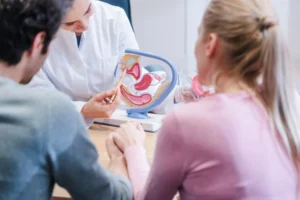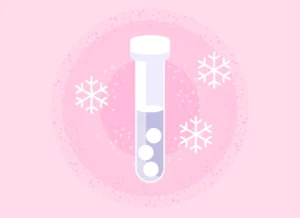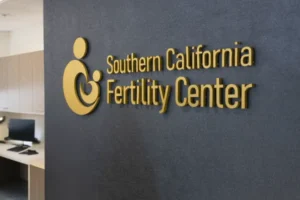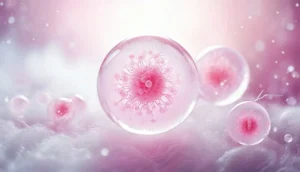Southern California Fertility Center Blog-Myth vs. Fact: Is 35 Really the Fertility Cut-Off Age?
Age often plays a big role when it comes to fertility. You may have heard that "35 is the key age." Many women feel like they are running out of time when they turn 35, as if their best chance to have a baby is almost gone. But is it really much harder to get pregnant at 35? The answer might surprise you.
Let's take a closer look at the most common myths and facts about fertility and how modern fertility options, such as egg freezing, are shifting the conversations.
Myth #1: Fertility Stops Completely at 35
 Fact: Fertility doesn't stop at 35, but it does gradually decline as a woman gets older. While many people focus on age 35 as a key point, fertility doesn't suddenly drop at this age. Most women in their early 30s still have a good chance of getting pregnant, but the decline starts to become more noticeable after 37.
Fact: Fertility doesn't stop at 35, but it does gradually decline as a woman gets older. While many people focus on age 35 as a key point, fertility doesn't suddenly drop at this age. Most women in their early 30s still have a good chance of getting pregnant, but the decline starts to become more noticeable after 37.
This decrease happens because women are born with all the eggs they will ever have. As they age:
- The number of eggs decreases over time.
- The quality of the eggs declines, which may lead to higher risks of genetic issues and miscarriages.
So, while age 35 is an important marker for fertility, it doesn't mean that getting pregnant is impossible after that age. Many women successfully have healthy pregnancies in their late 30s and even early 40s.
Myth #2: Age Only Matters for Women
Fact: Age affects men's fertility, although in a different way than it affects women. While women experience a more pronounced decline in fertility with age, men's sperm quality also changes as they grow older. Factors such as sperm count, motility, and DNA integrity can decrease over time, which may impact conception and pregnancy outcomes.
However, the effects of age on male fertility are generally more gradual and less predictable. However, couples thinking about having children should keep in mind the age of both the man and the woman when planning.
Myth #3: There's Nothing You Can Do About Age-Related Fertility Decline
 Fact: There are proactive steps to preserve fertility, and one of the most effective methods is egg freezing. Modern technology has transformed fertility care, making it possible for women to freeze their eggs while they are still healthy and viable. These frozen eggs can be used later to get pregnant, giving women greater control over when they choose to start their families.
Fact: There are proactive steps to preserve fertility, and one of the most effective methods is egg freezing. Modern technology has transformed fertility care, making it possible for women to freeze their eggs while they are still healthy and viable. These frozen eggs can be used later to get pregnant, giving women greater control over when they choose to start their families.
Who Should Consider Egg Freezing?
Freezing eggs is a helpful option for women who:
- They are in their 20s or early 30s and not ready for kids.
- Have busy careers or personal goals before starting a family.
- Need medical treatments (like chemotherapy) that could affect fertility.
- The desire is to increase the likelihood of a successful pregnancy in the future.
At Southern California Fertility Center, our experts use advanced methods to ensure the best success rates for freezing, storing, and fertilizing your eggs.
Meet Dr. Nastaran Foyouzi – A Leader in Fertility Care
 Choosing the right physician for your reproductive health is essential. Dr. Nastaran Foyouzi, the Medical Director at Southern California Fertility Center, combines exceptional expertise with compassionate care in every patient interaction.
Choosing the right physician for your reproductive health is essential. Dr. Nastaran Foyouzi, the Medical Director at Southern California Fertility Center, combines exceptional expertise with compassionate care in every patient interaction.
Dr. Foyouzi is board-certified in both Reproductive Endocrinology and Infertility, as well as Obstetrics and Gynecology. She provides her patients with comprehensive guidance and advanced treatment options. Her expertise encompasses a wide range of fertility services, including:
- Egg freezing and fertility preservation
- IVF and advanced reproductive technologies
- Genetic testing and embryo screening
- Fertility care for women over 35
Known for her patient-centered approach, Dr. Foyouzi takes the time to educate and empower women and couples, ensuring they feel confident in their fertility decisions. Under her leadership, the Southern California Fertility Center has become a trusted resource for individuals facing age-related fertility concerns.
The Reality of Fertility After 35
Here's what the data shows:
- In your early 30s, you have a 15–20% chance of getting pregnant each month.
- At age 35, that chance drops to about 10%.
- By age 40, your chance is around 5% per cycle.
These numbers highlight why freezing your eggs before age 35 can be important. It helps preserve the quality of your eggs for future use.
Egg Freezing Success Stories
 Many women at SCFC have opted for egg freezing as part of their life plan. For instance, one patient froze her eggs at the age of 32 and then returned at 38 to begin IVF. Thanks to her earlier decision, she achieved a successful pregnancy using the eggs she had frozen years earlier.
Many women at SCFC have opted for egg freezing as part of their life plan. For instance, one patient froze her eggs at the age of 32 and then returned at 38 to begin IVF. Thanks to her earlier decision, she achieved a successful pregnancy using the eggs she had frozen years earlier.
This demonstrates how technology and careful planning can empower women to create the families they have always envisioned—on their own timelines.
When to See a Fertility Specialist
If you are over 35 and trying to get pregnant, don’t wait too long to seek help. Here’s what to consider:
- If you’re under 35, try for 12 months before seeing a fertility specialist.
- If you’re 35 or older, seek help after 6 months of trying without success.
At the Southern California Fertility Center, we can run tests to check your ovarian reserve, hormone levels, and overall reproductive health. Based on your results, we'll develop a personal strategy to help you get pregnant now or save your eggs for the future.
 Conclusion: 35 Is a Milestone, Not a Deadline
Conclusion: 35 Is a Milestone, Not a Deadline
Turning 35 is a key point when considering having children, but it's not too late. Women now have more choices than ever due to advances in technology, access to helpful resources, and innovative methods like egg freezing.
If you are thinking about egg freezing or exploring your fertility choices, contact Southern California Fertility Center. Our caring team is ready to help you every step of the way.
1. What are the signs of poor egg quality?Poor egg quality can be difficult to identify without fertility testing, but some signs may include difficulty conceiving, multiple miscarriages, or failed IVF cycles. Women may also experience irregular or absent periods, as well as poor embryo quality during fertility treatments.
2. How can I improve my egg quality naturally?Improving egg quality naturally can be achieved by adopting a healthy lifestyle. Focus on a fertility-boosting diet rich in antioxidants, healthy fats, and lean proteins. Reducing exposure to toxins, quitting smoking, limiting alcohol, and managing stress through acupuncture or meditation can also help improve egg health.
3. What causes poor egg quality?Poor egg quality can be caused by various factors, including aging (especially after 35), hormonal imbalances, genetic abnormalities, lifestyle choices (such as smoking and excessive alcohol), and environmental toxins. Chronic health conditions and certain medications can also affect egg quality.
4. What foods help improve egg quality?Foods rich in antioxidants, healthy fats, and essential vitamins can help improve egg quality. Consider adding foods such as leafy greens (like spinach), berries, nuts (like walnuts), fatty fish (such as salmon), and whole grains (like quinoa) to your diet. These foods support hormonal balance and reduce oxidative stress.
5. Can acupuncture improve egg quality?Yes, acupuncture can help improve egg quality by promoting blood circulation to the ovaries and balancing hormone levels. It has been shown to support overall fertility by reducing stress and improving ovarian function. Many women incorporate acupuncture alongside other fertility treatments to enhance their chances of conception.
6. Is it possible to get pregnant with poor egg quality?While poor egg quality can make conception more difficult, it is still possible to get pregnant. For women with poor egg quality, assisted reproductive technologies like IVF (with egg retrieval) or egg donation can increase the chances of a successful pregnancy. It’s essential to consult a fertility specialist to explore the best options for your situation.
7. What supplements are helpful for improving egg quality?Supplements like Coenzyme Q10 (CoQ10), Vitamin D, Myo-Inositol, and Folic Acid are commonly recommended to improve egg quality. These supplements help enhance mitochondrial function in eggs, regulate reproductive hormones, and support overall fertility. Consult with your doctor before starting any supplementation.
8. Can late ovulation affect egg quality?Late ovulation can sometimes be associated with poor egg quality. Eggs released later in the cycle may not be as viable, and hormonal imbalances can affect ovulation timing. If you’re experiencing late ovulation or irregular cycles, it’s a good idea to consult a fertility expert for evaluation and advice on improving egg quality.



 Freezing eggs involves removing a woman's eggs and storing them in a frozen state for potential future use. This procedure enables individuals to preserve their fertility at a younger age. They can then use the eggs in the future when they want to have children.
Freezing eggs involves removing a woman's eggs and storing them in a frozen state for potential future use. This procedure enables individuals to preserve their fertility at a younger age. They can then use the eggs in the future when they want to have children. Thinking about freezing your eggs in 2025? Here's what you should know:
Thinking about freezing your eggs in 2025? Here's what you should know: